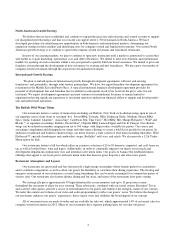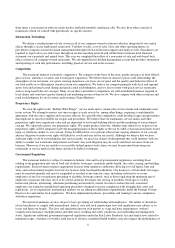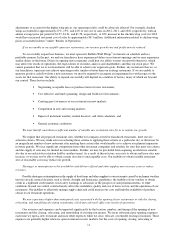Buffalo Wild Wings 2012 Annual Report Download - page 13
Download and view the complete annual report
Please find page 13 of the 2012 Buffalo Wild Wings annual report below. You can navigate through the pages in the report by either clicking on the pages listed below, or by using the keyword search tool below to find specific information within the annual report.13
We evaluate the useful lives of our intangible assets to determine if they are definite- or indefinite-lived. Reaching a
determination on useful life requires significant judgments and assumptions regarding the future effects of obsolescence,
demand, competition, other economic factors (such as the stability of the industry, legislative action that results in an
uncertain or changing regulatory environment, and expected changes in distribution channels), the level of required
maintenance expenditures, and the expected lives of other related groups of assets.
We cannot accurately predict the amount and timing of any impairment of assets. Should the value of goodwill or other
intangible assets become impaired, there could be an adverse effect on our financial condition and consolidated results of
operations.
We are dependent on franchisees and their success.
Currently, approximately 57% of our restaurants are franchised. Franchising royalties and fees represented
approximately 7.4%, 8.6%, and 9.5% of our revenues during fiscal 2012, 2011, and 2010, respectively. Our performance
depends upon (i) our ability to attract and retain qualified franchisees, (ii) the franchisees’ ability to execute our concept and
capitalize upon our brand recognition and marketing, and (iii) franchisees’ ability to timely develop restaurants. We may not
be able to recruit franchisees who have the business abilities or financial resources necessary to open restaurants on schedule,
or who will conduct operations in a manner consistent with our concept and standards. Also, our franchisees may not be able
to operate restaurants in a profitable manner.
Franchisees may take actions that could harm our business.
Franchisees are independent contractors and are not our employees. We provide training and support to franchisees, but
the quality of franchised restaurant operations may be diminished if franchisees do not operate restaurants in a manner
consistent with our standards and requirements, or if they do not hire and train qualified managers and other restaurant
personnel. If franchisees do not adequately manage their restaurants, our image and reputation, and the image and reputation
of other franchisees, may suffer materially and system-wide sales could significantly decline. In addition, we may also face
potential claims and liabilities due to the acts of our franchisees based on agency or vicarious liability theories.
We could face liability from our franchisees.
A franchisee or government agency may bring legal action against us based on the franchisee/franchisor relationships.
Various state and federal laws govern our relationship with our franchisees and our potential sale of a franchise. If we fail to
comply with these laws, we could be liable for damages to franchisees and fines or other penalties. Expensive litigation with
our franchisees or government agencies may adversely affect both our profits and our important relations with our
franchisees.
We may be unable to compete effectively in the restaurant industry.
The restaurant industry is intensely competitive. We believe we compete primarily with regional and local sports bars,
casual dining and quick casual establishments, and to a lesser extent, quick service wing-based take-out concepts and quick
service restaurants. In addition, independent owners of local or regional establishments may enter the wing-based restaurant
business without significant barriers to entry and such establishments may provide price competition for our restaurants.
Competition in the casual dining, quick casual and quick service segments of the restaurant industry is expected to remain
intense with respect to price, service, location, concept and the type and quality of food. We also face intense competition for
real estate sites, qualified management personnel, and hourly restaurant staff.
Our success depends substantially on the value of our brand and our reputation for offering guests an unparalleled
guest experience.
We believe we have built a strong reputation for the quality and breadth of our menu items as part of the total
experience that guests enjoy in our restaurants. We believe we must protect and grow the value of our brand to continue to be
successful in the future. Any incident that erodes consumer trust in or affinity for our brand could significantly reduce its
value. If consumers perceive or experience a reduction in food quality, service, or ambiance, or in any way believe we failed
to deliver a consistently positive experience, our brand value could suffer.
























